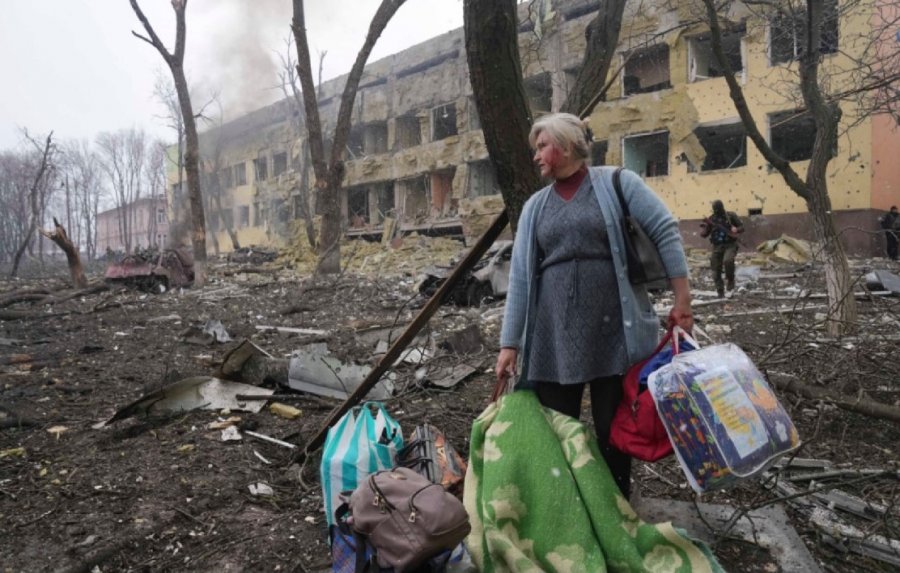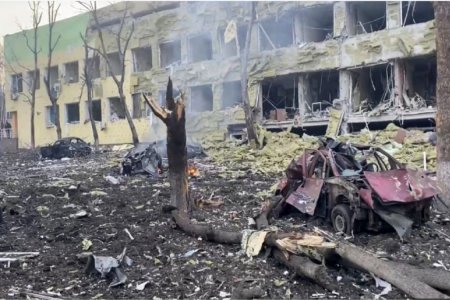
Russia has reportedly sent the last doctors out of occupied Mariupol despite the real danger of epidemic in a city devastated by Russian bombing and shelling.
Petro Andriushchenko , Adviser to the Mayor of Mariupol, reports that the city has been left without doctors as of 4 July since “the Moscow troop of 17 occupiers in white coats has been sent home. There were no Mariupol doctors before that, so you can say that as of today, there is no medical care in Mariupol.”
Although there may be some exaggeration here, it has long been clear how critical the situation is. On 23 June, Andriushchenko posted a timetable for when the remaining ten medical personnel of Intensive Care Hospital No. 2 in Mariupol could see patients. This was in a hospital serving the most densely populated district in the city, with the ten, many of them with very specific specializations, having to serve no less than 30-40 thousand people. Of the personnel, there were four doctors who had earlier worked in Mariupol hospitals, with the others presumably among those brought in, and now sent away.
Through its relentless destruction and siege of Mariupol, Russia has created a situation where there is no way of independently verifying the above information. There were, however, still western media on the ground back in March when Russia bombed and shelled Mariupol hospitals and used medical personnel and patients as living shields. Moscow’s attempts to deny responsibility for such attacks on medical facilities were then refuted by video and photographic evidence and both then and since by the testimony of witnesses. The dire situation was confirmed and condemned on 19 April by Bhanu Bhatnagar, spokesperson for the World Health Organization (WHO). Speaking from Lviv, Mr Bhatnagar said he feared for the worst for the health system of Mariupol. The city had been subjected to heavy bombardment by Russian forces and was largely destroyed. The situation was particularly disturbing because of the lack of access to the city. He said that WHO had set aside generators and other life-saving medicines and equipment as soon as access became possible. There is nothing to suggest that the situation has changed since then.
It was clear for months that humanitarian corridors were needed to bring food and medical supplies, and enable safe evacuation. Russia refused and is still refusing to provide such corridors. Instead, a large number of volunteers and medics who were trying to help residents have been taken prisoner, with the whereabouts of some of them unknown for months.
The invaders have concentrated on propaganda stunts, eradicating the Ukrainian language from road signs, from school education, etc. and have done little to resolve even the most burning issue of restoring water supplies and proper sewage. They appear to have also abandoned attempts to rebury the victims of bombings whose bodies lie buried in shallow graves in city parks and courtyards, or dumped in a former supermarket.. One of the reasons for the failure to resolve a horrific situation which has led to bodies being dumped in a former supermarket, and mounting fears of a cholera outbreak, appears to be banal corruption. The invaders want people to pay them (reportedly 20 thousand roubles) to have relatives buried. Those unwilling, or, more unlikely, unable to pay could see the bodies of their loved ones effectively left out on the street in the summer heat.
There are, in fact, grounds for believing that there may already be cholera in Mariupol, while there is no reason to expect the occupiers to either admit this, or do something about. While it is already feared that the number of Mariupol residents killed by Russia’s invasion may be at least double the initial figure given of 20 thousand, that number is likely to rise because of shortages of insulin and other critically needed medication.



